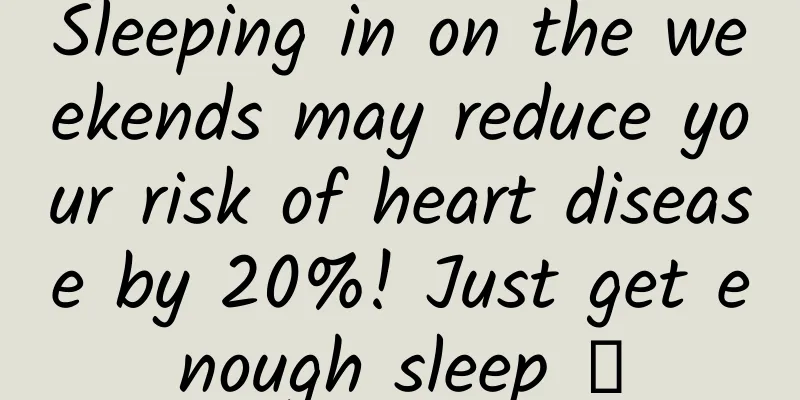Sleeping in on the weekends may reduce your risk of heart disease by 20%! Just get enough sleep →

|
Compiled by: Gong Zixin Can you really make up for all the late nights you stay up late during the week on weekends? Does it affect your heart health? Recently, the official website of the European Society of Cardiology (ESC) announced a new study conducted by Chinese scientists in 2024: People who "catch up on sleep" by sleeping in on weekends may reduce their risk of heart disease by 20%. "Adequate compensatory sleep is associated with a lower risk of heart disease," said researchers from the National Center for Cardiovascular Disease, Fuwai Hospital, Chinese Academy of Medical Sciences. "This association was more pronounced in people who were frequently sleep deprived on weekdays." It’s well known that sleep-deprived people will sleep in on their days off to mitigate the effects of sleep deprivation. However, research is lacking on whether this compensatory sleep is beneficial for heart health. The researchers used data from 90,903 subjects in the UK Biobank project. To assess the relationship between compensatory sleep on weekends and heart disease, sleep data were recorded using an accelerometer and grouped into quartiles (four roughly equal groups based on the most to least compensatory sleep): Group 1 had the least compensatory sleep, ranging from -16.05 hours to -0.26 hours (i.e. less sleep); Group 2 had -0.26 to +0.45 hours; Group 3 had +0.45 to +1.28 hours, and Group 4 had the most compensatory sleep (1.28 to 16.06 hours). Insufficient sleep was self-reported by the participants, and those who slept less than 7 hours per night were defined as insufficient sleep, with a total of 19,816 (21.8%) participants having insufficient sleep. The remaining study subjects may occasionally be insufficiently sleepy, but on average, their daily sleep duration did not meet the criteria for insufficient sleep. The researchers also collected information from participants' hospitalization records and cause-of-death registries for various heart disease diagnoses, including ischemic heart disease (IHD), heart failure (HF), atrial fibrillation (AF), and stroke. After a median follow-up of nearly 14 years, participants who had the most compensatory sleep were 19% less likely to develop heart disease than those who had the least compensatory sleep. In the subgroup with insufficient daily sleep, participants who had the most compensatory sleep had a 20% lower risk of heart disease than those who had the least compensatory sleep. The study analysis showed no differences between men and women. "Our results suggest that for a large proportion of the modern population who suffer from sleep deprivation, those who catch up the most sleep on weekends have significantly lower odds of heart disease than those who catch up the least," the researchers noted. The cover image and images within this article are from the copyright gallery (or copyright holder). Any reproduction or use may lead to copyright disputes. |
<<: Researching new materials with AI is fast
>>: It is called "soft gold in water" and China now produces it the largest amount in the world!
Recommend
Mount Fuji has not snowed since October. How abnormal is this? | Nature Trumpet
Hello everyone, this is the 21st issue of the Env...
What are the promotion strategies used by platforms such as Tencent, Baidu, and Bytedance?
What trends are shown in advertising placement on...
8 ways to play red envelopes to activate the community
Community operation is the term that operators ar...
Review of the method of making a poster that can increase the number of fans per day, and a practical growth strategy
Before talking about the logic of fission posters...
How to promote offline activities?
In a year, it is always necessary to plan and exe...
Snowden says US government hacked global mobile networks
Documents from Edward Snowden released by The Int...
Xpeng Motors Wuhan factory project officially launched, accelerating the separation process with Hainan Mazda
New car manufacturers often face a choice when en...
Fenda was once very popular, but then faded out of users’ sight. Why?
In 2016, when knowledge payment platforms were on...
The “traffic pool” of programmatic advertising: SSP
The SSP platform is an advertising platform that ...
Information flow advertising material placement ranking competition, if you cooperate well, you will win!
A tank. I play jungle. Team fight in the middle l...
Discovered the magical solar system, not only has four gas giants, but also two asteroid belts
The planetary system around the star HR8799 is st...
How to prepare the 2016 annual report? How to make a marketing promotion and operation plan in 2017?
2016 Annual Report Guidelines 1. Overall operatio...
Using this method, promotion costs can be reduced by 50%!
When doing marketing promotion or researching use...
Tutorial on Creating a Mobile Interaction Design Checklist
For mobile applications, mobile scenarios are ver...
Google reportedly secretly plans to add cloud computing services
According to Fortune, sources say Google is secre...






![[Making a living by speculating in antiques 2007] Dark horse super large band tactics](/upload/images/67cc299796d5c.webp)


